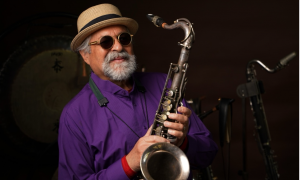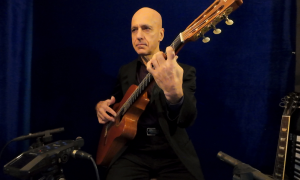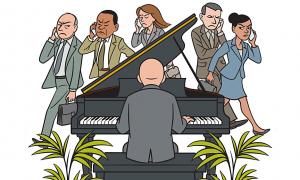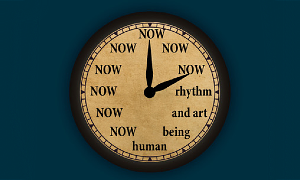It's often been said that silent films are a lost art twice over. Not only are movies without sound not being made anymore, but many of the classics of the period also no longer physically exist. That, however, is not the end of the story.
For what's less well known is that pictures long thought to be lost forever, key works unseen for decades, have a remarkable tendency to regularly turn up in ways as exciting and dramatic as the films themselves. And so it is with Fritz Lang's masterwork, “Metropolis."
Sunday night at Grauman's Chinese Theatre as part of the TCM Classic Film Festival (with a full run scheduled at Laemmle's Royal starting May 14), a 2-hour, 27-minute version of Lang's film will get its North American debut after a rapturous world premiere at the Berlin Film Festival.
Considered the most expensive German film of its day, “Metropolis" is celebrated as much for its spectacle as its story. Set in a mechanized city of the future where captains of industry live in towers and the slaves who do all the work dwell underground, “Metropolis" is simultaneously an examination of the future, a parable about capital and labor and the complicated story of an enigmatic young woman named Maria, played by Brigitte Helm.
This “Metropolis," which will be accompanied by a live performance by the always compelling Alloy Orchestra, is 25 minutes longer than any version seen in more than 80 years. Because Lang's picture is an icon of the silent era and the foundation stone of science-fiction cinema, this news has electrified fans and scholars of early film. Finding this new material was, as Glenn Erickson of the Web column DVD Savant put it, “akin to recovering lost books of The Bible." Experts were so certain it was lost that a restored version of “Metropolis" completed in 2002 was declared definitive.
Making the story even better is the circumstances of the recovery. The missing footage turned up in the storeroom of Argentina's small Museo del Cine, a location described by Sight & Sound's Karen Naundorf as “a forgotten and temporarily closed museum, surrounded by warehouses and factories in the Baracas district of Buenos Aires." This was so unlikely a situation that when Germany's Lang experts were informed of the find, they didn't even bother to reply. “You can't imagine," one of them later said, “how often I get e- mails from people who claim to have found 'Metropolis,' and it's never true."
Yet small museums and private collections often lack the money and manpower to properly examine their holdings and thus are often the scenes of surprising discoveries. One of the great Japanese silents, Teinosuke Kinugasa's 1926 “A Page of Madness," was found in a rice barrel in the garden of the director's country home. “The Last of the Duanes," a celebrated Tom Mix western, was discovered under layers of bird excrement on the floor of a chicken farm building in a remote Czech village. And actor James Mason came across many of Buster Keaton's personal 35mm prints lying neglected in the garage of the comedian's former home.
The story of the rediscovered 25 minutes goes back to the 2-hour, 33-minute premiere in 1927 of the film. The initial critical and audience response was tepid and that length made UFA, the German distributor, nervous, so the film was cut to approximately 90 minutes, which is how “Metropolis" went out to most of the world.
However, the Argentinean distributor, Alolfo Z. Wilson, had other ideas. He brought the long version to Argentina, and in time, that print became the property of a critic-collector named Manuel Pea-Rodriquez. He eventually sold his films to the Argentinean state, which destroyed the dangerous nitrate original and made the 16mm copy, which came eventually to the Museo del Cine.
One of the key people in the rediscovery of that footage was a historian and collector named Fernando Pea, who's not related to Pea-Rodriquez, who had suspected since 1988, when a friend recounted vivid memories of seeing a 21/2-hour version, that the full version of “Metropolis" was in Argentina.
For what's less well known is that pictures long thought to be lost forever, key works unseen for decades, have a remarkable tendency to regularly turn up in ways as exciting and dramatic as the films themselves. And so it is with Fritz Lang's masterwork, “Metropolis."
Sunday night at Grauman's Chinese Theatre as part of the TCM Classic Film Festival (with a full run scheduled at Laemmle's Royal starting May 14), a 2-hour, 27-minute version of Lang's film will get its North American debut after a rapturous world premiere at the Berlin Film Festival.
Considered the most expensive German film of its day, “Metropolis" is celebrated as much for its spectacle as its story. Set in a mechanized city of the future where captains of industry live in towers and the slaves who do all the work dwell underground, “Metropolis" is simultaneously an examination of the future, a parable about capital and labor and the complicated story of an enigmatic young woman named Maria, played by Brigitte Helm.
This “Metropolis," which will be accompanied by a live performance by the always compelling Alloy Orchestra, is 25 minutes longer than any version seen in more than 80 years. Because Lang's picture is an icon of the silent era and the foundation stone of science-fiction cinema, this news has electrified fans and scholars of early film. Finding this new material was, as Glenn Erickson of the Web column DVD Savant put it, “akin to recovering lost books of The Bible." Experts were so certain it was lost that a restored version of “Metropolis" completed in 2002 was declared definitive.
Making the story even better is the circumstances of the recovery. The missing footage turned up in the storeroom of Argentina's small Museo del Cine, a location described by Sight & Sound's Karen Naundorf as “a forgotten and temporarily closed museum, surrounded by warehouses and factories in the Baracas district of Buenos Aires." This was so unlikely a situation that when Germany's Lang experts were informed of the find, they didn't even bother to reply. “You can't imagine," one of them later said, “how often I get e- mails from people who claim to have found 'Metropolis,' and it's never true."
Yet small museums and private collections often lack the money and manpower to properly examine their holdings and thus are often the scenes of surprising discoveries. One of the great Japanese silents, Teinosuke Kinugasa's 1926 “A Page of Madness," was found in a rice barrel in the garden of the director's country home. “The Last of the Duanes," a celebrated Tom Mix western, was discovered under layers of bird excrement on the floor of a chicken farm building in a remote Czech village. And actor James Mason came across many of Buster Keaton's personal 35mm prints lying neglected in the garage of the comedian's former home.
The story of the rediscovered 25 minutes goes back to the 2-hour, 33-minute premiere in 1927 of the film. The initial critical and audience response was tepid and that length made UFA, the German distributor, nervous, so the film was cut to approximately 90 minutes, which is how “Metropolis" went out to most of the world.
However, the Argentinean distributor, Alolfo Z. Wilson, had other ideas. He brought the long version to Argentina, and in time, that print became the property of a critic-collector named Manuel Pea-Rodriquez. He eventually sold his films to the Argentinean state, which destroyed the dangerous nitrate original and made the 16mm copy, which came eventually to the Museo del Cine.
One of the key people in the rediscovery of that footage was a historian and collector named Fernando Pea, who's not related to Pea-Rodriquez, who had suspected since 1988, when a friend recounted vivid memories of seeing a 21/2-hour version, that the full version of “Metropolis" was in Argentina.





























